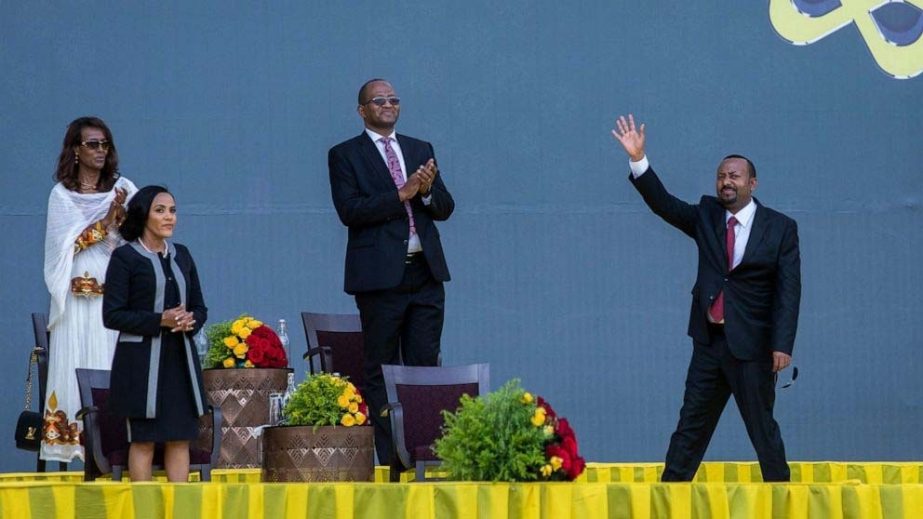
UNB, Kenya :
Ethiopian Prime Minister Abiy Ahmed is already a veteran at surprising the world in just three years in power. He’s done it again this week by announcing that, after a year of waging war, he will lead it from the battlefront.
Abiy’s rule has been short in the vast sweep of Ethiopian history, but he has spent almost all his life preparing for it. Told as a child by his mother that she believed he would lead Ethiopia, he now speaks of martyrdom, if needed, to hold the nation together.
Abiy rocketed to office out of seemingly nowhere in 2018 with vows of dramatic reforms to a long-repressive national government. He also announced he would make peace with neighboring Eritrea after years of bitter conflict. For that, the youthful prime minister was awarded the Nobel Peace Prize.
Then, less than a year later, Abiy announced his military was at war with the leaders of Ethiopia’s northern Tigray region, who had dominated the previous national government but quickly found friction with the prime minister. Political differences turned to gunfire in November 2020.
Tens of thousands of people have been killed since then, and close to half a million people inside Tigray now face the world’s worst famine crisis in a decade, one that the United States has called “entirely man-made.”
The 45-year-old Abiy has now plunged into the fight, arriving at the battlefront on Tuesday, a government spokesman said.
The prime minister is no stranger to war. As a teenager, he joined fighters who eventually overthrew the country’s Marxist Derg regime, then signed up for the new government’s military. He took part in Ethiopia’s war against Eritrea as a radio operator, serving at the border in Tigray, and later became a lieutenant colonel.
Now roles are dramatically reversed. The Tigray fighters Abiy once called friends are now the enemy, and the Eritrean soldiers he once fought have been allowed to join the war as Ethiopia’s allies.
Years after his career turned from the military to politics, Abiy faces a battlefield challenge he has never faced before: Commanding an army.
But the prime minister is known as a man with a sense of destiny.

He “clearly has a personal sense of his right to be ruler of Ethiopia and take on the responsibility it entails,” said Christopher Clapham, a retired professor associated with the University of Cambridge.
Overseeing the fracture of Ethiopia, a nation with a 3,000-year history, would be a “massive blow” to Abiy, Clapham said, and by heading to the battlefront he is following the tradition of emperors.
But emperors can fall, and governments, too. The rival Tigray forces, whose advance on Ethiopia’s capital in recent weeks prompted a national state of emergency, want to see Abiy gone, by force if needed.
The deeply religious prime minister came to office preaching national unity, and representing it as well. The son of a Christian and Muslim and of mixed ethnic heritage, he shocked Africa’s second-most populous country by apologizing for the past government’s abuses. Tigrayans have recalled cheering him on, at first.
“War is the epitome of hell for all involved,” Abiy said in his Nobel address in those earlier days.
Now the hardened positions by the warring sides, each believing they can be victorious, have tested the efforts of mediators from the United States and African Union. Abiy believes the Tigray forces will be pushed back into their region, U.S. envoy Jeffrey Feltman said this week. But he added, “I question that confidence.”
The war front, Feltman said, is edging closer to Ethiopia’s capital, with the Tigray fighters newly on the move toward Debre Sina, less than a day’s drive from Addis Ababa. The fighters are also trying to cut off a crucial supply line from neighboring Djibouti, a further threat to Africa’s diplomatic capital.
Accordingly, a growing number of countries have told their citizens to leave immediately. And the U.S. has told Americans again and again that no Afghanistan-style evacuation is coming for them.
The war, Abiy said in announcing his move to the battlefront, “is a struggle that determines whether we exist or not. But we will definitely win. It is unthinkable for Ethiopia to be defeated. We are in a time when it requires to lead the country by paying the sacrifice.”
He called on fellow Ethiopians to meet him there.

